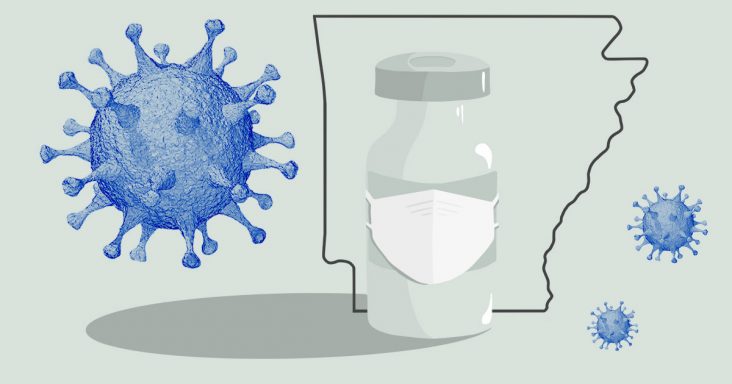COVID-19 deaths in Arkansas surpass estimate of Spanish flu deaths
by September 2, 2021 4:44 pm 1,740 views

Arkansas on Thursday (Sept. 2) reported 34 COVID-19 deaths, pushing the cumulative total to 7,003 and above the estimated 7,000 Arkansas deaths caused by the Spanish flu in 1918-19. The ongoing “public health war” is trending toward a “strategic defeat,” said Dr. Cam Patterson, chancellor and CEO of the University of Arkansas for Medical Sciences (UAMS).
The Arkansas Department of Health also on Thursday reported 2,453 new cases in the previous 24 hours, bringing the cumulative total to 458,234. Hospitalizations fell by 23 to 1,290, and COVID patients on ventilators fell by two to 355. Active cases rose by 263 to 23,077.
“The virus has taken the lives of over 7,000 Arkansans. I cannot count on two hands the number of friends and associates I know who have died from Covid-19,” Gov. Asa Hutchinson said in a statement. “My heart goes out to every family and friend who has lost a loved one to this virus. It’s a somber reminder of the toll this pandemic has taken and a reminder that we must continue to fight this virus together to save lives.”
Patterson was more blunt in his assessment of the fight.
“More Arkansans have died of COVID-19 than have died in all wars since 1900. We are in a public health war, and we are losing it,” he noted in a statement to Talk Business & Politics. “Although we continue to win some battles, vaccine hesitancy and a weariness in complying with safe practices like masking, hand washing and social distancing are leading us to a strategic defeat and more deaths as we enter the fall and winter. We need ALL Arkansans to join us in the fight against COVID-19 to avoid this likely outcome.”
The ADH on Thursday also reported only 19 ICU beds available among the 1,140 beds in the state.
Arkansas Secretary of Health Dr. Jose Romero said the loss of so many lives is even more tragic when considering we now have several COVID vaccines.
“This is indeed a grim and tragic milestone reached today. It is made all the more so because today, unlike the 1910s, we have access to proven measures to prevent the transmission of SARS-CoV-2 and to protect Arkansas from severe disease and death: effective and safe COVID-19 vaccines. Unfortunately, we will continue to add to the death toll of the COVID pandemic in Arkansas until we have widespread acceptance of the available vaccines,” he said.
Dr. Joe Thompson, president and CEO of the Arkansas Center for Health Improvement, said UAMS projections indicate the virus impact may not soon improve.
“Unfortunately, this aligns with modeling by the UAMS College of Public Health that predicted 7,000 deaths by Aug. 30. UAMS’ forecasters also predicted more than 4,500 new cases per day by Sept. 14; we must take action to make sure that prediction does not come true. Getting protected through vaccination is the best tool we have to end this pandemic,” Thompson noted.
The U.S. Centers for Disease Control and Prevention (CDC) estimates 50 million people died worldwide from Spanish flu, with 675,000 U.S. deaths. As of Thursday, the CDC reported 641,725 U.S. COVID deaths. According to the Encyclopedia of Arkansas, the leading theory behind the Spanish flu is that it begin in rural Haskell County, Kan., where people lived close to their pigs and poultry.
With the entry of the United States into World War I on April 6, 1917, men were drafted and sent to large training camps before being transported to Europe, with many of those camps inadvertently serving as super spreader sites for the new virus. The Encyclopedia of Arkansas and many other sources suggest at least 7,000 Spanish flu deaths in Arkansas, but suggest the number may have been higher.
“The disease spread to rural areas of Arkansas, where many deaths likely went unreported. It cannot be determined how many rural residents died because of several factors: lack of medical care in isolated areas, no telephones or other means of communication, lack of literacy skills to record the deaths, and no cemetery records, since many were buried in unmarked graves in family burial grounds,” noted the Encyclopedia of Arkansas.
